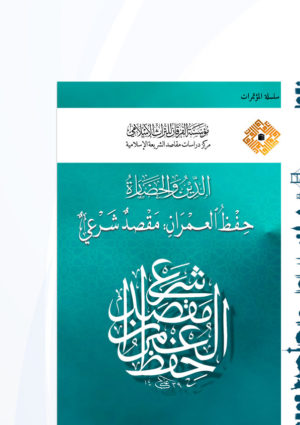Dozens of leading scholars and researchers from 15 countries converged on Istanbul to participate in the Conference, “Religion & Civilisation: Protection of Civilisation as a Purpose of Religion”. This was co-organised by the Centre for the Study of the Philosophy of Islamic Law at Al-Furqān Islamic Heritage Foundation, Ibn Haldun University, and the Alliance of Civilisations Institute. The Conference was hosted at Ibn Haldun University in Istanbul, and took place from Friday 19th October to Sunday 21st October 2017.
The idea for this international conference was founded on Ibn Khaldun’s conceptualisation of civilisation as an objective of Islamic law. Indeed, Ibn Khaldun’s scientific corpus continues to be a rich source for researchers, not only in the sphere of academic studies and criticism, but also informing new epistemological theory. The conference organisers’ intent was to bring one aspect of Ibn Khaldun’s thought into the spotlight, namely civilisation as an Islamic law objective; given the utility of its application in addressing contemporary reality and its rapid changes.
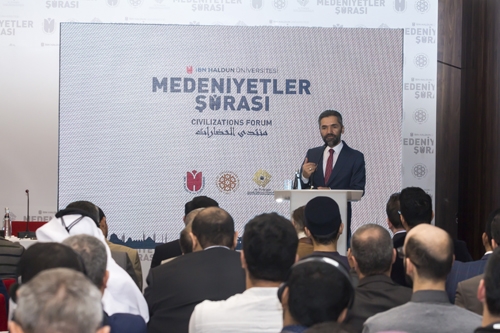
Dr Recep Şentürk, President of Ibn Haldun University and the Alliance of Civilisations Institute, opened the proceedings on Friday morning, 19 October, giving a speech explaining the idea of the Conference. He indicated that Ibn Haldun University, and the Alliance of Civilisations Institute, in collaboration with Al-Furqān Islamic Heritage Foundation, had jointly organised this forum. The object was to bring together the representatives of different civilisations to generate a thoughtful discussion on issues of civilisation. He added that many prominent scholars and speakers were participating in this conference to explore the best means for the re-evaluation of the formulation and development of topics related to “civilisation as an objective of Islamic law”. He also presented a comprehensive overview of Ibn Haldun University that had been established the previous year.
In turn, Mr Sali Shahsivari, Managing Director at Al-Furqān Islamic Heritage Foundation, emphasised the importance of the Conference in his opening speech. He elaborated on the idea that the basis of all the religious rulings delivered by the Messengers, was to secure the objective of attaining and protecting a civilised way of life. Moreover, in absolute terms, a religious objective encompassed anything that achieved and preserved a balanced state of communal human civilisation, free of injustice, oppression, or aggression. Indeed, without such civilisation, human existence could not be perfected, nor would human development progress; in the absence of civilisation, the role of humans as God’s vicegerents on earth would not be fulfilled.
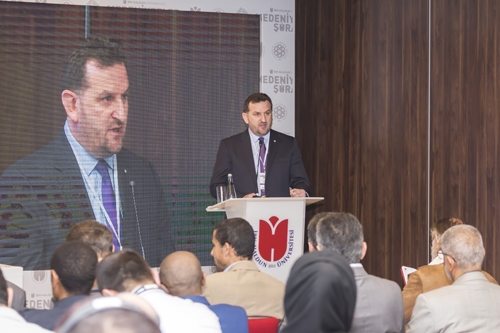
Mr Shahsivari added that today, the world and humanity are enduring political, economic, social, and moral conditions bordering on an invitation of destruction of civilisation and the world; in the backdrop was modernism’s failure to create an ideal civilisation, with the exclusion of religion from all aspects of life; therefore, it was imperative to interrogate the reasons that led to this crisis in the world generally, and in the Muslim nation in particular. Moreover, he pointed to the Conference’s vital importance and role in identifying the root problem, emphasising religion as the basis of civilisation.
The first day’s conference sessions focused principally on the Islamic law objectives (maqāṣid). Dr Jassim Sultan delivered a lecture on “The conditions of readiness for establishingʿumrān”, then Dr Mesfir Al Qahtani on “The objective of civilisational ‘umrān: A critical scientific view”, followed by the sociologist, Dr Mazen Hashem on “The objectives ofʿumrān: methodological issues”.
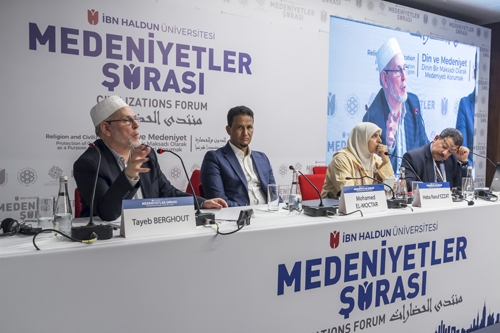
Further sessions comprised lectures by Dr Badrane Benlahcene on “The role of religion in achieving socialʿumrān”, Dr Abdelmajid Najar on “The role of society in buildingʿumrān: A Sharīʿah objective”, Dr Saifeldin Abdelfattah on “The objective of preservingʿumrān and good governance”, Dr Mohamed El-Moctar Shinqiti on “The relationship between authoritarianism and decadence in Islamic civilisation: Reading into the concept of “public disinterest” in Kawākibī’s thought”, and Dr Tayeb Bergouth on “The movement of civilisational cycles and the network of general laws affecting it: A methodological, Qurʾānic and objective-based approach”.
Subsequently, Dr Hayrettin Yücesoy delivered his lecture on “Before civilisation: Notions of human collectivism in the premodern Middle East”. In turn, Dr Hüseyin Yilmaz delivered “From city to civilisation: The origins of the Ottoman concept of civilisation”.
Each lecture was followed by discussion and comments from the participants.
On the second day, His Excellency, the President of the Republic of Turkey, Recep Tayyip Erdoğan attended. He thanked the organisers of this key Conference, and announced that in the next three years, Ibn Haldun University would be fully constructed in the Islamic style. In his address, he emphasised the Islamic civilisation’s role as the sole force capable of protecting humanity for the world.
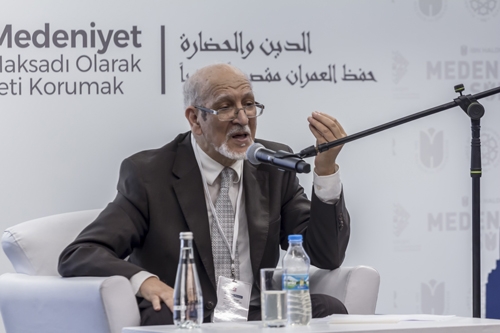
The afternoon of the second day witnessed a keynote lecture by the guest of honour, Dr Taha Abdurrahman, titled “Human trusteeship (amānah) and civilisational responsibility”.
The Conference addressed the topic of ‘umrān and civilisation from various perspectives in 62 parallel workshop sessions, taking place over days two and three of the Conference. These covered the themes of religion, civilisation, literature, economics, music, education, medicine, environment, and technology.
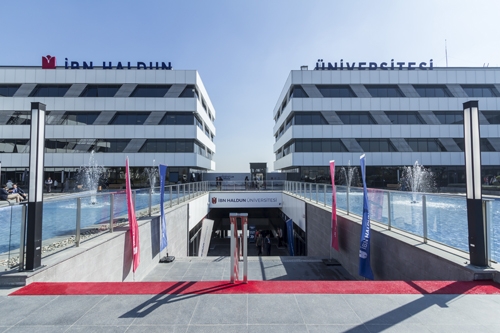
The Conference closed with a lecture by Abdul-Wahed El-Wakil on “Architecture, religion and civilisation”, and the forum declaration read out by Dr Burhan Köroğlu.


